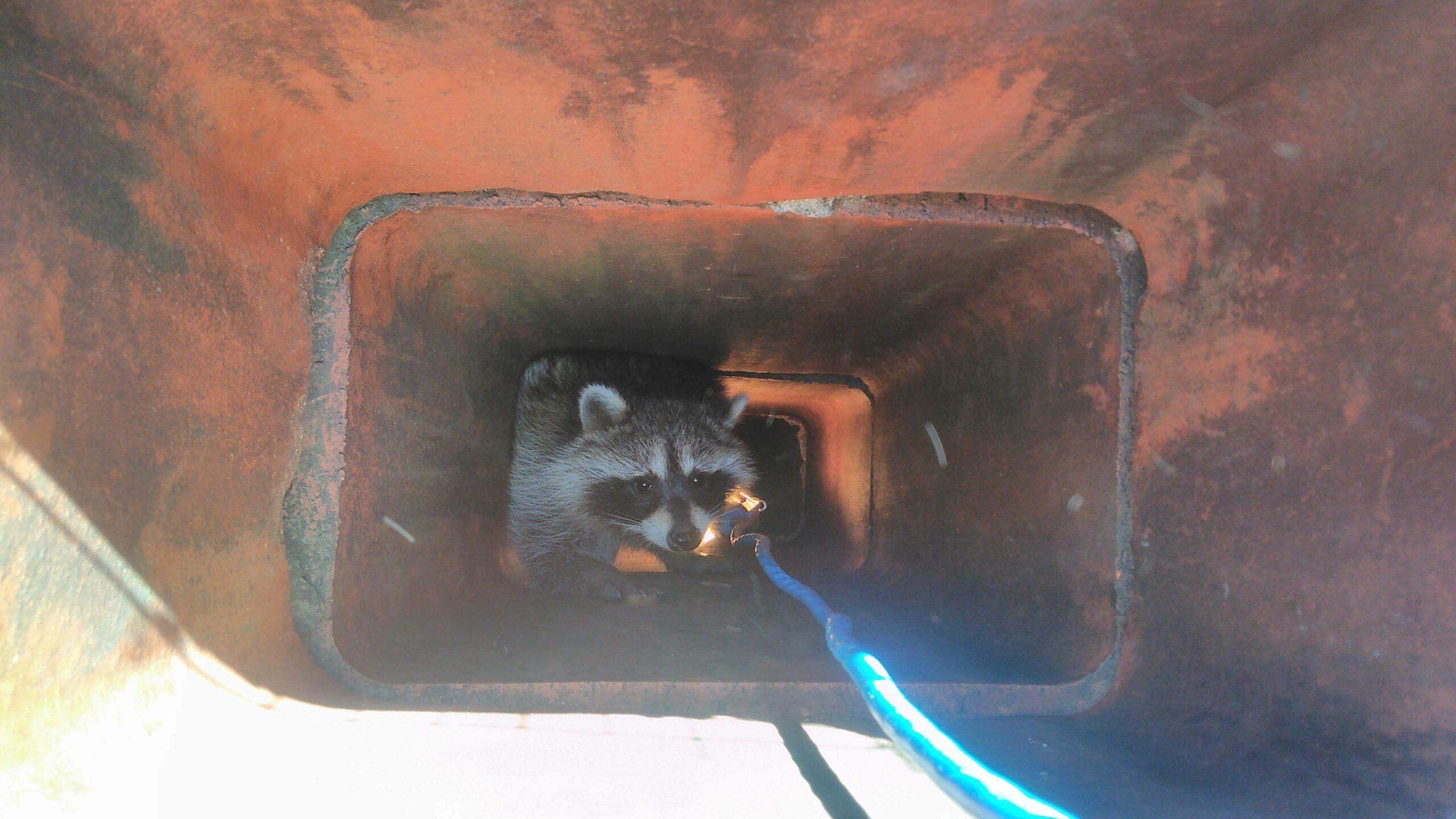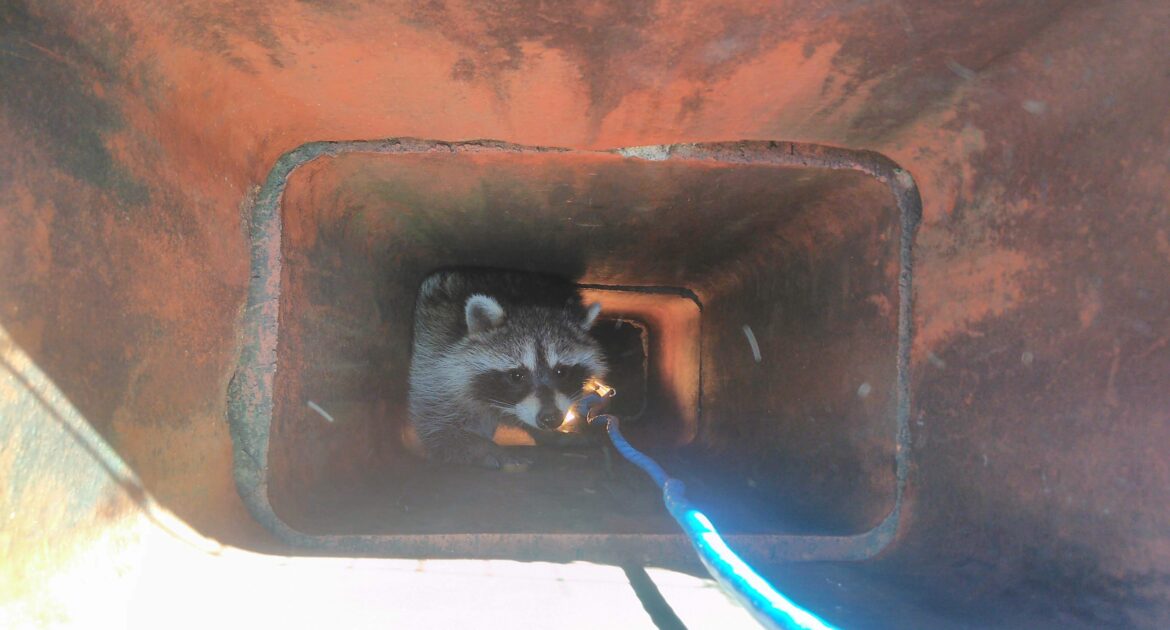If you’re dealing with raccoons on your property, you’ve likely wondered when the right time is to seek professional help, especially if you’re unsure about raccoon mating season. At Skedaddle, we are wildlife control experts and often work with homeowners to protect their properties from unwanted raccoon visitors during this critical time.
Understanding when raccoon mating occurs, how it impacts their behavior, and how to address their presence effectively can save you significant stress and potential property damage. If you want to learn how to deal with raccoons, here’s everything you need to know about their mating season and humane raccoon removal in St. Paul.
What You Need to Know About Raccoon Mating Season
Raccoon mating season typically occurs during the late winter months, beginning in January and lasting through March in colder climates like St. Paul. During this period, raccoons exhibit more active behavior as they search for mates and later prepare for birthing and nurturing their young. Male raccoons roam larger distances while females begin identifying denning areas that offer shelter and safety for their potential offspring. For homeowners, this season often increases the likelihood of raccoons encroaching on private properties, including attics, garages, and crawl spaces.
One of the biggest challenges during raccoon mating season is the noise and disturbance it brings. Mating calls can be loud and unsettling, and the animals’ scurrying and scratching while seeking dens can disrupt your daily life. Beyond the noise, raccoons may cause extensive property damage as they create entry points into buildings. Their sharp claws make them skilled climbers, allowing access to chimneys, roof vents, and soffits, where they might carve out nesting spaces. Furthermore, raccoons use human dwellings for birthing in the spring, leading to multiple animals settling in.
When it comes to this season, the most significant concern is preventing raccoons from taking residence in your living space. Once a raccoon settles into an area, particularly to give birth, removing it humanely becomes a more complicated, time-sensitive task. The presence of infant raccoons also requires expert intervention to ensure their safe relocation alongside the adult. Timely identification of raccoon activity during mating season, such as droppings, damaged roof systems, or entry attempts, is critical to mitigate issues early.
Why Raccoon Mating Season Poses Unique Challenges for St. Paul Homeowners
Living in St. Paul exposes homeowners to the unique challenges of raccoon mating behaviors that overlap with the cold weather conditions of Minnesota. Unlike other warm-weather climates, raccoons adapt to regional restrictions by prioritizing warm, secluded den spaces. Unfortunately, homes with inadequate wildlife-proofing are prime targets for raccoons seeking refuge from freezing temperatures while entering their reproductive season. This regional factor contributes to a heightened sense of urgency for St. Paul residents to secure their properties against invasions in winter.
Another noteworthy characteristic of raccoons during mating season is their territorial behavior. Male raccoons often compete aggressively for mates, which can escalate noise disturbances and the frequency of sightings on your property. Residents may notice raccoons digging through garbage bins, scavenging in the night, or even marking territories near yard perimeters as they prepare for birthing nests. While raccoons naturally avoid humans, the added stress of finding a secure location can make them more daring and prone to entering human-occupied spaces.
Property damage risks increase significantly when raccoons detect accessible areas. Broken screens, loose shingles, or even small gaps around a home’s roofline can entice pregnant females to settle for several months, leading to scratched walls, soiled insulation, and disrupted HVAC systems. These damages cost significantly more to repair if not addressed proactively. Beyond structural harm, raccoons often carry bacteria and parasites that threaten your household’s health. Being aware of raccoon habits during mating season is essential for prompt intervention.
The key takeaway for St. Paul residents during this mating period is that early detection and prevention are the foundation of successful raccoon removal. At Skedaddle, we strongly encourage homeowners to routinely inspect their roofs, attics, and outdoor sheds at the first sign of unusual animal activity. Look for common indicators like tracks, droppings near entryways, or distinct claw marks. If there’s any evidence of raccoon nesting during the colder months, seeking professional wildlife control significantly reduces long-term complications.
Humane and Effective Raccoon Removal Methods for Mating Season
If you’ve identified raccoon activity on your property, taking immediate steps to address the situation is vital. However, dealing with raccoons requires a humane and strategic approach, especially during mating season. Removing raccoons without harming them ensures compliance with wildlife protection laws while safeguarding your household from potential retaliatory behavior by stressed animals. At Skedaddle, we’ve developed proven raccoon removal solutions tailored to homeowners’ needs during this time of increased wildlife activity.
Our removal process begins by assessing the property to locate nesting areas and potential entry points. For example, if raccoons have already entered your attic, they often leave clear signs of activity, such as droppings near insulation or specific entry pathways. Once located, the first step involves securely sealing off alternate entry points to prevent further invaders. Any open route that isn’t immediately addressed will attract additional raccoons from nearby populations, especially as mating season peaks.
Next, one-way doors or exclusion devices are installed at raccoon entry points, allowing animals to leave safely while preventing them from re-entering. If young raccoons are present, additional care and time are factored in to remove the family unit together. Humane practices are vital, allowing mother raccoons to relocate their young while avoiding harm. This meticulous process ensures that once the raccoons are removed, recurrence is improbable due to the secure sealing of access points.
The final step in our service package is cleanup and decontamination. Raccoon nesting leaves behind a range of hazardous materials, such as urine-soaked insulation, torn debris, and parasites like fleas or ticks. Cleaning these materials without professional equipment risks spreading contamination further throughout the house. Our technicians handle this process safely, leaving your home hygienic and ready for permanent raccoon-proofing solutions. Investing in professional services during mating season provides peace of mind knowing similar issues won’t arise in subsequent years.
To deter future invasions, additional structural reinforcements like heavy-gauge screening for vents or chimneys can make your property inaccessible. While fixing holes and gaps can seem like a minor concern initially, the extra preventive layers help St. Paul homeowners avoid costly reoccurrences involving the same raccoon population. Pairing cleanup with preventive maintenance guarantees the home remains secure during even the busiest wildlife mating events.
Safeguard Your Home from Raccoons This Season
Dealing with raccoons during mating season can be a frustrating and overwhelming experience for homeowners. Their increased activity, nesting behaviors, and property damage risks make this particular time of year challenging for St. Paul residents. However, with the proper understanding of their habits and proactive measures, you can effectively protect your home from unwanted intrusions.
If you suspect raccoon activity around your property, the best course of action is to trust professionals with removal and prevention. At Skedaddle, we bring decades of experience in humane wildlife control methods to help homeowners regain control of their spaces. Don’t wait for mating season to turn into a costly intrusion—contact Skedaddle today and ensure your home stays raccoon-free, no matter the season.




